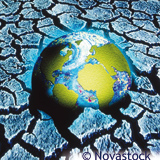|
Clear scientific evidence, extreme weather events,
and an increased public awareness have elevated climate change to the top
of the political agenda — globally, regionally and at national levels. At
ITU, combating climate change is also a major priority.
It is estimated that information and
communication technologies (ICT) contribute around 2 to 2.5 per cent of
global greenhouse gas (GHG) emissions every year. This percentage is
likely to grow as ICTs become more widely available. But at the same
time, ICTs are a linchpin in the effort to combat climate change. They
are a potent, cross-cutting tool that can help to limit, and ultimately
reduce, GHG emissions across other sectors of the economy, notably
through the development and introduction of more energy-efficient
devices and networks and the safe disposal of equipment at the end of
its life cycle. Efforts should be focused on more standardized power
supplies and batteries, smart devices and buildings, new low-consumption
devices, research and development on consumption and power supplies, use
of ICTs in travel management and paperless meetings.
 As a global organization
with 191 Member States and more than 700 Sector Members and Associates,
ITU will work in close partnership with its membership to achieve a climate-neutral
ICT industry. As a global organization
with 191 Member States and more than 700 Sector Members and Associates,
ITU will work in close partnership with its membership to achieve a climate-neutral
ICT industry.
 As the steward
of the global framework for spectrum, ITU will provide the necessary
radio-frequency spectrum and orbit resources for satellites that monitor
the climate and conduct remote sensing of the Earth. As the steward
of the global framework for spectrum, ITU will provide the necessary
radio-frequency spectrum and orbit resources for satellites that monitor
the climate and conduct remote sensing of the Earth.
 As the pre-eminent
global body for standardization in the field of ICTs, ITU will work
to limit and reduce GHG emissions and promote the use of more energy-efficient
devices and networks and the development of corresponding technical standards. As the pre-eminent
global body for standardization in the field of ICTs, ITU will work
to limit and reduce GHG emissions and promote the use of more energy-efficient
devices and networks and the development of corresponding technical standards.
 As a core function
of its development mission, ITU will assist Member States to take
full advantage of ICT applications for environmental management and sustainable
development and to use telecommunications/ICTs to adapt to, and mitigate
the effects, of climate change. As a core function
of its development mission, ITU will assist Member States to take
full advantage of ICT applications for environmental management and sustainable
development and to use telecommunications/ICTs to adapt to, and mitigate
the effects, of climate change.
 As the specialized
agency of the United Nations responsible for telecommunications/ICTs, ITU is committed to working with other organizations in combating
climate change. ITU will continue to play a leading role in developing an
integrated approach to examining the relationship between ICTs and climate
change, focusing on such key issues in the global framework as technology,
climate data collection and monitoring, adaptation and mitigation. As the specialized
agency of the United Nations responsible for telecommunications/ICTs, ITU is committed to working with other organizations in combating
climate change. ITU will continue to play a leading role in developing an
integrated approach to examining the relationship between ICTs and climate
change, focusing on such key issues in the global framework as technology,
climate data collection and monitoring, adaptation and mitigation.
 As a responsible
member of the global community, ITU will join the UN commitment to
lead by example through achieving climate-neutral status within three years.
In its own activities, ITU is pioneering the use of ICTs to reduce GHG emissions
through paperless meetings, virtual conferencing, and teleworking. It will
share its expertise with other institutions in optimizing the use of ICTs
as a vital component of energy-efficient working methods. ITU will continue
to promote the use of ICTs to strengthen and develop scientific and industrial
tools in all areas, to the fullest extent possible, to combat climate change. As a responsible
member of the global community, ITU will join the UN commitment to
lead by example through achieving climate-neutral status within three years.
In its own activities, ITU is pioneering the use of ICTs to reduce GHG emissions
through paperless meetings, virtual conferencing, and teleworking. It will
share its expertise with other institutions in optimizing the use of ICTs
as a vital component of energy-efficient working methods. ITU will continue
to promote the use of ICTs to strengthen and develop scientific and industrial
tools in all areas, to the fullest extent possible, to combat climate change.
Climate change is a global challenge that the world
community cannot lose. I invite you to join ITU in making ICTs a major part
of the solution, and in building an information society that is energy efficient
and sustainable.
Dr Hamadoun I. Touré
|


